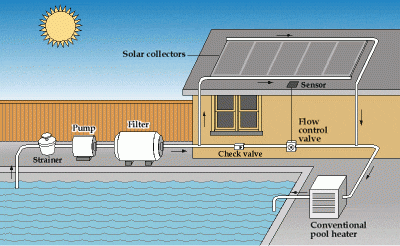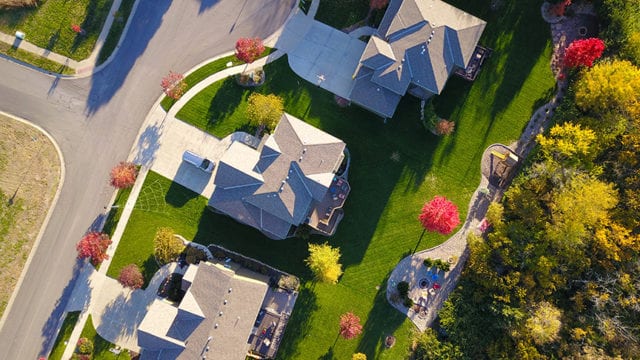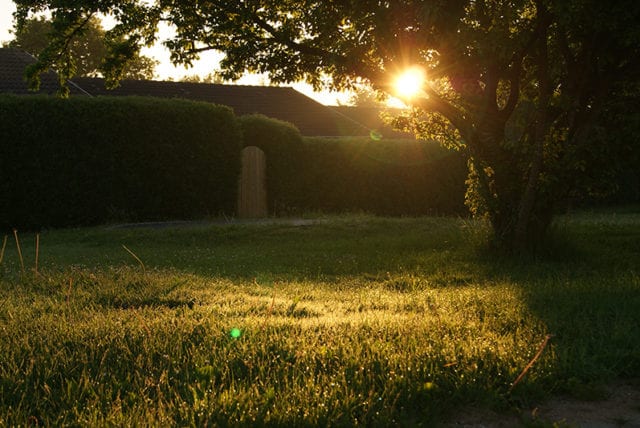GUIDE TO HEATING YOUR POOL
Heating your swimming pool gives you a higher return on your investment simply by allowing you to swim more often. Most people find swimming in water between 82° and 84°F in temperature most comfortable and enjoyable. The temperature of your pool water will naturally fluctuate with the weather and in warmer climates it can only get up to 75 degrees, even in the summer months! Therefore, a heater is essential to maintaining the optimal swimming temperature to enjoy your pool to the fullest.
So, what are your pool heating options?
Your options include heat pumps, gas heaters (of several varieties), solar heaters, conventional electric models and more, each with its own advantages and disadvantages. Different methods are best suited for different types of swimming pools. Therefore, when shopping for a heater, you should consider both the features of the heater itself and the environment in which the heater would operate.
Air-Source Heat Pumps
With low operating costs and energy efficient, air-source heat pumps are steadily growing in popularity. Heat pumps transfer heat from the air to your swimming pool using electricity. They are most effective in warmer climate areas and when used on a regular basis. We have found that air-source heat pumps greatly benefit consumers who live in climates where the average air temperature exceeds 60°F (15.5°C) and consumers who use their swimming pools year-round. So, this option is perfect for most Florida residents!
Advantages of Air-Source Heat Pumps
- Are energy efficient
- Low operating costs. For example, heat pumps typically cost between $50 and $150 per month to operate.
- Typical life span is 10 years.
- Only using electricity to transfer energy and emit no pollution, they are very environmentally friendly
- Some air-source heat pumps can be used to both heat and cool your swimming pool.
Disadvantages of Air-Source Heat Pumps
- Heat pumps have high upfront costs, with many available for purchase for between $2,000 and $4,000.
- Heat pumps offer slower heating than gas heaters.
- Air-source heat pumps operate less efficiently in lower temperatures.
Water-Source Heat Pumps
Water-source heat pumps embrace newer technology, and therefore are not as widely used as other types of heating systems. They are, however, growing in popularity, as they have high efficiency and low operating costs. We have found that water-source heat pumps greatly benefit consumers who live in climates where the average air temperature is below 60°F (15.5°C) and consumers who use their swimming pools year-round. A water-source swimming pool heat pump, also referred to as a geothermal heat pump, transfers heat from a water-source to your swimming pool water.
Water-Source Systems
Because many types of bodies of water exist, many types of water-source heat pumps exist. Some common water-source systems are a deep ground well. It consists of two deep wells: one that supplies water to the heat pump and one that returns water back to the ground.
Advantages of Water-Source Heat Pumps
- Are energy efficient
- Low operating costs. For example, heat pumps typically cost between $50 and $150 per month to operate.
- Water-source heat pumps operate independently of air temperature.
- Typical life span is 10 years.
- Only using electricity to transfer energy and emit no pollution, they are very environmentally friendly
Disadvantages of Water-Source Heat Pumps
- Heat pumps have high upfront costs, with many available for purchase for between $2,000 and $4,000.
- Heat pumps offer slower heating than gas heaters.

Solar Heaters
Solar energy plays a dominant role in environmentally friendly products in the pool industry. Solar swimming pool heating systems obtain their heat from the sun. Because solar heaters depend on the sun to heat swimming pools, they mostly benefit consumers who live in very sunny areas.
Advantages of Solar Heaters
- Because solar heaters operate with the swimming pool circulation pump, they have no additional operating costs.
- Environmentally friendly: a clean energy source and they emit no pollutants.
- Typical life span is 25 years.
- Solar energy systems are energy-efficient, as they require no additional electricity to operate.
- Solar heaters can be used to both heat and cool your swimming pool.
Disadvantages of Solar Heaters
- While solar energy is free, a solar heater is the most expensive of heating systems to purchase, with prices varying between $4,000 and $7,000.
- Can’t heat a swimming pool during the night.
- Slower heating time.
- Solar panels take up a lot of space.
Electric Resistance Heaters
Electric resistance heaters use electric currents to create heat. Because electric resistance heaters consume large amounts of electricity, they are primarily used to heat spas and small therapy pools and are rarely used to heat swimming pools.
Advantages of Electric Resistance Heaters
- Prices can be found for under $2,000
- Operate independently of air temperature.
- Environmentally friendly because they do not pollute air.
- Take up very little space.
Disadvantages of Electric Resistance Heaters
- They require large amounts of electricity.
- Require heavy-duty electrical wiring to install.
Gas heaters have been the primary way of heating swimming pool for decades, since gas prices were so low. However, as gas prices increase throughout the years, consumers have begun searching for more affordable ways to heat their pools, and, as a result, other heating methods have increased in popularity. However, gas heaters are still very beneficial in colder climates. Also, they are more ideal for swimming pool owners who live in climates where the temperature is below 60°F (15.5°C) and swimming pool owners who only heat their swimming pools a few times each year.
Advantages of Gas Heaters
- Prices can be found for under $1,500
- Fast heating.
- Operate independently of air temperature.
Disadvantages of Gas Heaters
- The least efficient heating method.
- Very expensive to operate due to raised gas prices.
- Typical life span is 5 years.
- Not environmentally friendly.
Each method provides several benefits, but there’s one pool heating solution that proves to be efficient, resilient and intuitive—a heat pump pool heater. Homeowners looking to extend their pool seasons, while staying cost-efficient and environmentally conscious, are turning to heat pump pool heaters to solve their heating needs. There are additional options but this one seems to be the best option for year-round pool swimmers.


